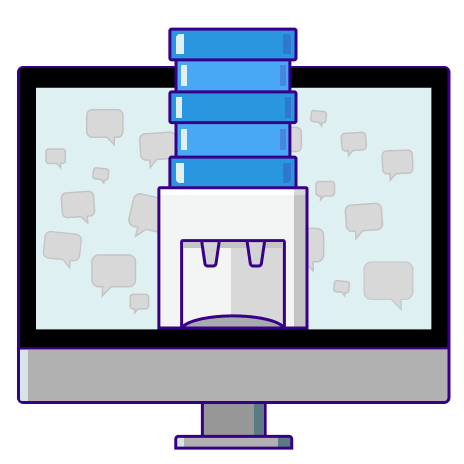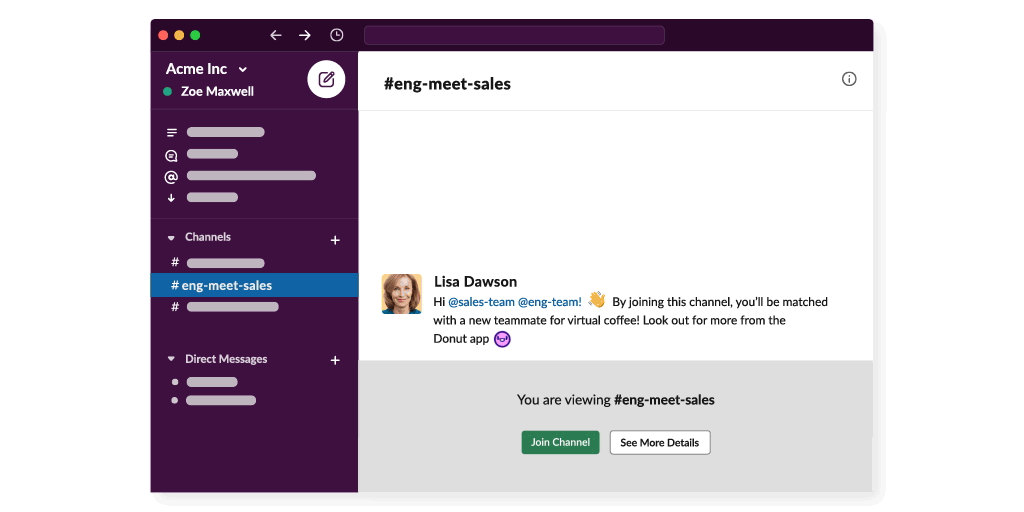This piece was originally posted on the Slack blog on March 30, 2022. It has been reformatted for the Donut blog.
***
In November 2021, the U.S. labor market recorded that 4.5 million workers quit or changed jobs—the most in the survey’s history. It doesn’t help that workplace connection and satisfaction can be a huge challenge in today’s largely remote world. It’s not easy to get to know people that you don’t see in the break room or elevator, especially if you’re a new hire or part of a larger organization.
Enter Donut, a Slack app that helps foster camaraderie and collaboration from anywhere. All it takes is joining a channel and the Donut app does the rest, breaking the ice by automatically introducing teammates who might not know each other.

“When creating Donut, we asked people where they live their work lives,” says Dan Manian, CEO and co-founder of Donut. “Slack kept coming up as the place where culture happened, no matter if people work remotely or in offices.”
The Donut app for Slack allows users to:
- Automatically introduce teammates in Slack via direct messages
- Break the ice between paired teammates with conversation starters
- Prompt discussion in Slack channels with Donut Watercooler topics
- Never let a team birthday or work anniversary go unnoticed with Donut Celebrations
Since the app launched in 2016, it’s made more than ten million connections across 20,000 companies, including Slack itself. Manian shares why Slack was the right place for Donut to launch, and how he and his colleagues researched the business need before writing any code.
The need for workplace connection in a digital world
In the early days of his career, Manian navigated building connections at fast-growing startups. “There’s that early-day magic when camaraderie just happens,” he says. “Then, when you grow to 100, 500 or 1,000 people, you see someone in a hallway and don’t even know you work together.”
Once Manian and his colleagues identified the need for an app that made building workplace relationships easier as organizations grow, they had to figure out where the app would live and how it would work.
“We talked with hundreds of people about how culture changed as their companies scaled,” he says. “It was clear that Slack was their headquarters.”
Here’s why the Donut team decided to build the app experience around Slack:
- Rapid adoption. By meeting users where they already work in Slack, Donut makes it quick and easy for them to engage in social programs without needing to go through long sign-up flows or install a new mobile app.
- Intuitive experience. Donut is built around the familiar experiences of Slack channels, so users are able to quickly learn how to use it without much guidance or education.
- Reach and distribution. Slack has hundreds of thousands of customers who are eager to enrich their Slack experience with apps. By distributing Donut through the Slack App Directory, the Donut team is able to put their app right in front of them.
“We had both 20-person startups and Fortune 500 companies installing us. We knew that connection mattered everywhere, but the breadth and amount of companies that started embracing Donut was amazing.”Dan Manian
Donut, Cofounder and CEO
Making employee connection simpler and more pleasant
According to potential Donut users, a key pain point of running social programs for employees was tracking who was meeting who, and when.
“We saw a lot of manual coffee or lunch roulettes,” says Manian. “They’d use a spreadsheet list of employees and tell five of them to reach out to another five. It could not be left on autopilot.”
With just a few clicks, Donut users can choose messaging templates and create channels. The app then automatically makes introductions among new employees, the C-suite and within or across departments. The power of Donut is in its ease of use and flexibility: Where there’s a need for team connection, there’s an opportunity for Donut to automate the mechanics behind connecting people with each other.
“People took Donut and started to create use cases we’d never thought of, like peer-to-peer learning and snail mail buddies,” says Manian. One Donut customer used the app to create a buddy program that connected work-from-home experts with work-from-home newbies. Another matched people from different regions so they could mail each other something special from their hometowns.

“People took Donut and started to create use cases that we’d never thought of, like peer-to-peer learning and snail mail buddies.”Dan Manian
Donut, Cofounder and CEO
Intuitive socializing in the remote work era
When the pandemic forced organizations to shift to remote work, Donut usage skyrocketed as teams turned to Slack for new, creative ways to stay connected.
After listening to customer feedback and their desire for more flexible, asynchronous ways of working, Donut was inspired to create a new product, Watercooler, another lightweight way to spark connections with your team. The feature works in any existing Slack channel, or can be set up as a new #watercooler channel, automatically posing questions about favorite places to travel, engage in friendly debates like, “Pancakes vs. waffles?” and more.
“Watercooler wasn’t on our original product roadmap,” says Manian. “But as soon as everybody flipped to fully remote work, we heard this outcry of, ‘I need a little daily social interaction.’”

Another product spawned from customer feedback is Celebrations — a way to ensure every birthday or work anniversary gets celebrated the way you want. Donut collects dates for key milestones and allows each individual to set their preferences, so it’s easy to skip your birthday if you’d rather not be in the spotlight. For those who do want recognition, Donut automatically sends a message in a designated channel, prompting everyone to pile on emoji reactions and celebrate together.
The growing number of developer tools from Slack like Block Kit Builder allowed Donut developers to react quickly to user feedback and push out new features like Watercooler and Celebrations. “With so many components and UI elements available in Slack, there’s so much that’s possible,” he says.
Understanding your customers is key
For other developers seeking to build apps for Slack, Manian offers his advice:
- Spend time with customers. Listen closely, test and iterate often before your app hits the Slack Directory. You can learn a lot by just asking them what they’re currently doing and what else they spend money on to address the problem that your app solves.
- Understand how customers buy Slack. The Donut team wanted to empower anyone to use their app, which drove their decision to launch a free version so usage isn’t bound by seniority or function. They also have a separate selling option that supports the way large, enterprise companies buy software.
Regardless of company size, the Donut effect is clear. Looking to the future, the Donut team wants to explore more inclusive ways for people to connect. “Not everybody wants to do coffee meetings, so there should be other ways for folks to get to know their employees,” Manian says. “We constantly want to offer new, inclusive ways for people to connect. How can we offer new mechanisms that are still built right into where they’re doing their work?” We’ll stay tuned to find out.